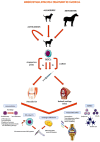Review: Mesenchymal Stem Cell Therapy in Canine Osteoarthritis Research: "Experientia Docet" (Experience Will Teach Us)
- PMID: 34095280
- PMCID: PMC8169969
- DOI: 10.3389/fvets.2021.668881
Review: Mesenchymal Stem Cell Therapy in Canine Osteoarthritis Research: "Experientia Docet" (Experience Will Teach Us)
Abstract
Osteoarthritis (OA) is currently an incurable and progressive condition in dogs causing chronic joint pain and possibly increasing disability. Due to the poor healing capacity of cartilage lesions that occur with OA, development of effective therapeutics is difficult. For this reason, current OA therapy is mostly limited to the management of pain and inflammation, but not directed ad disease modification. In the search for a safe and effective OA treatment, mesenchymal stem cells (MSCs) have been of great interest since these cells might be able to restore cartilage defects. The designs of OA studies on MSC usage, however, are not always consistent and complete, which limits a clear evaluation of MSC efficacy. The general study results show a tendency to improve lameness, joint pain and range of motion in dogs suffering from naturally-occurring OA. Assessment of the cartilage surface demonstrated the ability of MSCs to promote cartilage-like tissue formation in artificially created cartilage defects. Immunomodulatory capacities of MSCs also seem to play an important role in reducing pain and inflammation in dogs. It should be mentioned, however, that in the current studies in literature there are specific design limitations and further research is warranted to confirm these findings.
Keywords: allogeneic; autologous; dog; mesenchymal stem cell; osteoarthiritis; xenogeneic.
Copyright © 2021 Brondeel, Pauwelyn, de Bakker, Saunders, Samoy and Spaas.
Conflict of interest statement
JS is employed with Boehringer-Ingelheim Animal-health (BI-AH) and author GP is employed by Global Stem cell Technology (GST). The remaining authors declare that the research was conducted in the absence of any commercial or financial relationships that could be construed as a potential conflict of interest.
Figures
Similar articles
-
Low-dose xenogeneic mesenchymal stem cells target canine osteoarthritis through systemic immunomodulation and homing.Arthritis Res Ther. 2023 Oct 3;25(1):190. doi: 10.1186/s13075-023-03168-7. Arthritis Res Ther. 2023. PMID: 37789403 Free PMC article.
-
Mesenchymal stem cells for cartilage regeneration in dogs.World J Stem Cells. 2019 May 26;11(5):254-269. doi: 10.4252/wjsc.v11.i5.254. World J Stem Cells. 2019. PMID: 31171954 Free PMC article. Review.
-
Mesenchymal stem cell sheet encapsulated cartilage debris provides great potential for cartilage defects repair in osteoarthritis.Med Hypotheses. 2012 Sep;79(3):420-1. doi: 10.1016/j.mehy.2012.05.024. Epub 2012 Jun 1. Med Hypotheses. 2012. PMID: 22658361
-
Mesenchymal stem cell-based therapy of osteoarthritis: Current knowledge and future perspectives.Biomed Pharmacother. 2019 Jan;109:2318-2326. doi: 10.1016/j.biopha.2018.11.099. Epub 2018 Nov 29. Biomed Pharmacother. 2019. PMID: 30551490 Review.
-
Study of bilateral elbow joint osteoarthritis treatment using conditioned medium from allogeneic adipose tissue-derived MSCs in Labrador retrievers.Res Vet Sci. 2020 Oct;132:513-520. doi: 10.1016/j.rvsc.2020.08.004. Epub 2020 Aug 8. Res Vet Sci. 2020. PMID: 32805699
Cited by
-
Local, systemic and immunologic safety comparison between xenogeneic equine umbilical cord mesenchymal stem cells, allogeneic canine adipose mesenchymal stem cells and placebo: a randomized controlled trial.Front Vet Sci. 2023 May 17;10:1098029. doi: 10.3389/fvets.2023.1098029. eCollection 2023. Front Vet Sci. 2023. PMID: 37266387 Free PMC article.
-
Mesenchymal Stem Cells in Veterinary Medicine-Still Untapped Potential.Animals (Basel). 2025 Apr 19;15(8):1175. doi: 10.3390/ani15081175. Animals (Basel). 2025. PMID: 40282009 Free PMC article. Review.
-
Intensive neurorehabilitation and allogeneic stem cells transplantation in canine degenerative myelopathy.Front Vet Sci. 2023 Jul 13;10:1192744. doi: 10.3389/fvets.2023.1192744. eCollection 2023. Front Vet Sci. 2023. PMID: 37520009 Free PMC article.
-
Cell-free therapy for canine osteoarthritis: current evidence and prospects.Vet Q. 2022 Dec;42(1):224-230. doi: 10.1080/01652176.2022.2145620. Vet Q. 2022. PMID: 36336651 Free PMC article.
-
Manufacturing Mesenchymal Stromal Cells for the Treatment of Osteoarthritis in Canine Patients: Challenges and Recommendations.Front Vet Sci. 2022 Jun 10;9:897150. doi: 10.3389/fvets.2022.897150. eCollection 2022. Front Vet Sci. 2022. PMID: 35754551 Free PMC article. Review.
References
-
- Sinusas K. Osteoarthritis: diagnosis and treatment. Am Fam Physician. (2012) 85:49–56. - PubMed
Publication types
LinkOut - more resources
Full Text Sources


